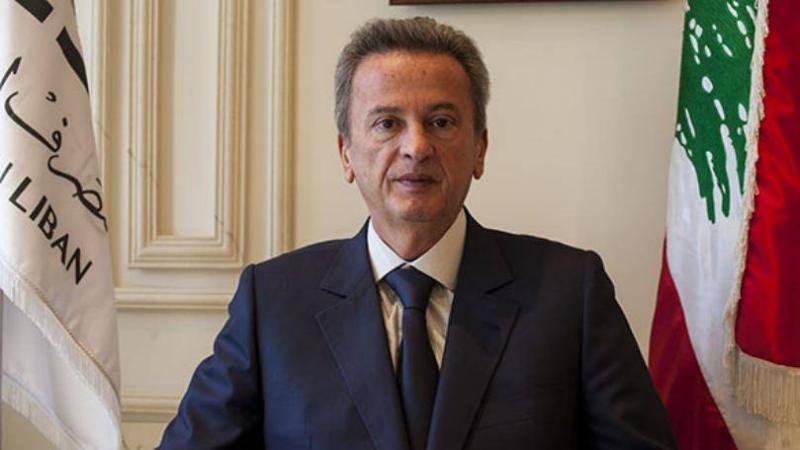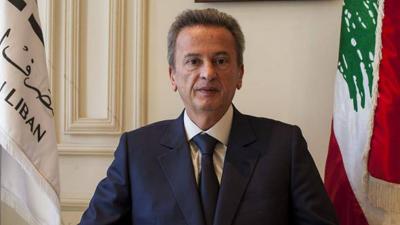Lebanon's central bank governor, Riad Salameh, announced that the central bank will begin operating at an exchange rate of 15,000 Lebanese pounds to the dollar starting February 1, 2023. This means that circulars 151 and 158 will apply to the 15,000 rate instead of the previous rates of 8,000 and 12,000. Salameh stated that Lebanon has entered a phase of unifying exchange rates, which began with the customs dollar decided by the Ministry of Finance along with other fees and taxes.
He emphasized that the circulars will remain in effect unless a capital control law is voted on, at which point all these circulars will be cancelled, and dealings between depositors and banks will be governed by that law. Responding to a question about exchange rates starting in February, Salameh told Al-Hurra TV's "Lebanese Scene" program with Mona Sleiba that there will be two rates: 15,000 and Sayrafa (the platform for determining the exchange rate). He noted that unifying the exchange rate cannot be achieved in one go; this will be the first phase until Sayrafa begins to establish the price.
Regarding whether this move will lead to an increase or decrease in the exchange rate, he indicated that the market will determine the rate based on supply and demand, but the central bank will monitor the situation closely. For instance, he stated that there is currently 70 trillion Lebanese pounds circulating in the market, and they could gather all the pounds whenever they choose, suggesting that the market is aware of this potential. He added that they could inject a billion dollars to stabilize the market from excess pounds.
Salameh considered that the current exchange rate is essentially liberalized, with transactions occurring at fluctuating prices. Even the price of gasoline follows market rates. However, even with price fluctuations, significant volatility should not be allowed. He mentioned that they are attempting to manage the crisis through these circulars, which face challenges beyond the central bank's control, such as the cessation of payments on foreign Lebanese bonds, which have largely isolated Lebanon from financial markets and made it difficult for dollars to enter the country, further complicated by the global economic impact of COVID-19.
According to recent statistics from the central bank, the Lebanese economy is expected to grow by around 2% in 2022, alongside an increase in imports and economic activity observed last summer. The main issue lies in the public sector, which puts a strain on the economy. He stressed the need to address public sector issues while there is increasing pressure on the private sector and banks, neglecting the required reforms in the public sector.
Regarding funding increases for public sector employees' salaries threefold, Salameh stated that this is the state's responsibility, not the central bank's. If the central bank resorted to printing money, it would create more inflation than that resulting from the devaluation of the Lebanese pound. Therefore, initial steps toward reform and securing state revenues are essential to fund these increases.
Before the increase, salaries amounted to 1 trillion and 300 million Lebanese pounds, increasing to 3 trillion and 300 million, meaning the central bank will inject $340 million over the next three months retroactively. When asked how this amount will be secured, he explained that they have developed methods for engaging with the market through Sayrafa and other means to secure dollars without undermining the central bank and avoiding worse outcomes.
He noted that the central bank's foreign assets stand at 10 billion and 300 million dollars, excluding gold, classified not as mandatory reserves but as foreign assets available for transactions with a budget of 15 billion and 200 million. This indicates the ability to maneuver 10 billion and 300 million externally.
From the beginning of the year until now, the central bank's holdings have decreased by 2 billion and 500 million dollars only, which means funding has been made available in both the private and public sectors, absorbing the depreciation of the euro since they have euros in their budget. Salameh mentioned that the International Monetary Fund advised that increases in the public sector should be well-considered, targeting active employees while noting that some employees may be outside the country. Therefore, it is necessary to reconsider how the state is managed, as the central bank alone cannot solve everything.
He stated that today, due to the pay increases, they need an additional 3 trillion and 300 million Lebanese pounds. He questioned how the dollar's exchange rate would be affected if circular 161 had not been implemented. However, given that many dollars are expected to enter the market, the dollar's exchange rate should either decrease or stabilize.
On how to provide dollars, Salameh outlined their strategies for market intervention, clarifying that contrary to claims, they do not withdraw dollars and hoard them but rather redistribute them, ensuring this distribution goes to the public rather than to importers and merchants as had been the case during the subsidy period. He asserted that while they have plans to secure salary increases, initially they will inject dollars and then seek alternative means to secure dollars, emphasizing this does not replace the need for essential reforms.
Salameh confirmed that he would not finance fuel purchases for electricity from the central bank's reserves. The government is considering the possibility of opening credits with subsequent payment after six months, agreeing on how to secure support for these credits without drawing from the central bank's reserves. He believes they can collect around 300 million dollars through taxation.
Regarding the decision about the Board of Directors of Baraka Bank, Salameh indicated that it is the Higher Banking Authority that makes such decisions after several sessions and consultations. He asserted that compliance with the central bank's circulars is necessary, and banks that do not comply may be referred to the independent Higher Banking Authority, whose decisions are not subject to review. He noted that the bank is facing liquidity and capital shortages and clarified that appointing an interim manager at the bank is not aimed at bank insolvency but rather hopes the interim manager will stabilize the situation and lead to a successful outcome.
He stated that the same reasons apply to Federal Bank, but due to confidentiality, he could not provide more details; however, it is clear that there is no intention to bankrupt these banks. When asked if he expects the number of banks in Lebanon to decrease post-restructuring, he anticipates a reduction, though not significantly, as it depends on the banks' owners’ ability to recapitalize.
On the fate of deposits, Salameh mentioned that they have endured negative publicity to prevent bank bankruptcies and save depositors' funds. He added that restoring deposits requires ensuring liquidity and creating economic movement to facilitate deposit repayment, essentially a recovery plan that the state needs to implement. Regarding the plan presented by Prime Minister Mikati's government, which promises to secure the first $100,000 of deposits, Salameh clarified that this is a deposit payment management plan and emphasized that ensuring liquidity is a prerequisite for paying deposits. He affirmed that the central bank has done everything possible to protect deposits by preventing bank bankruptcies.
In a different context, Salameh expressed his hope to conclude this phase of his life after his term ends on July 31. He stated that he has not appeared before Judge Ghada Aoun regarding the cases filed against him, as she ruled against him even before hearing him, based on political, doctrinal, or specific interests. He is willing to appear before a judge without preconceived judgments against him.
Regarding cases filed against him abroad, he denied any ongoing lawsuits, noting that there is a group in contact with another group in Lebanon that has submitted reports and conducted media campaigns related to those reports, with the public prosecutor opening investigations similar to those in any country. Concerning whether he would expose some names after his term ends, he affirmed his commitment to the law and Article 151 of the Currency and Credit Law, which prevents him from disclosing what he has learned even after his term expires. When asked if he would write his memoirs, he joked, "Maybe I'll make a movie for Netflix."




